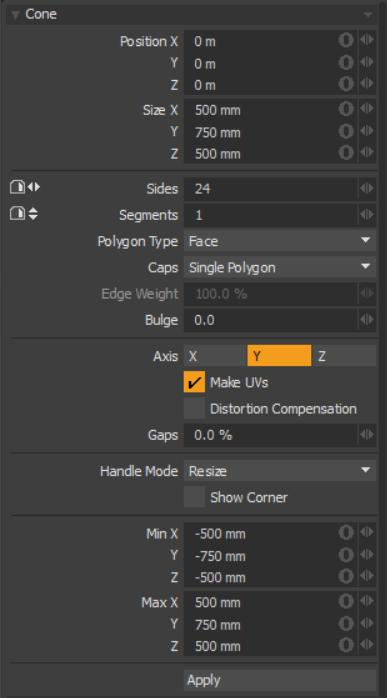Cone
The Cone primitive provides a simple method for creating conical shapes.
Note: For information on how to add primitives to your scene, see Adding Primitives.
When the Cone tool is active, the following options are available for editing the primitive:
Note: The properties allow you to generate subdivided, quad polygon cones that can be used in MeshFusion.

|
Cone |
|
|---|---|
|
Position X, Y, Z |
These three values establish the 3D location for the center of the cone. |
|
Size X, Y, Z |
These three values are used to establish the dimensions of the cone. Set to 50 cm, 75 cm, 50 cm, by default. As a radius they produce a cone that is .75 meter tall and 1-meter across at the base. |
|
Sides |
The sides are the latitudinal edges of the cone running from top to bottom. By default, the primitive cone uses 24 sides. By increasing this value you can increase the number of "cuts" in the cone. This also increases the smoothness of the cone by adding extra facets. |
|
Segments |
The segments are longitudinal edges of the sphere running from right to left. By default, the primitive cone uses 12 segments. By increasing this value you can increase the number of "cuts" along the cone. This is useful if you plan to deform the cone, as these segments act as hinges during deformation operations. |
|
Polygon Type |
Selects the type of polygons to use for the cylinder. Choose from: • Face - Create standard, unsmoothed polygon faces. • Subdivs - Create smoothed subdivision surfaces. • Catmull Clark - Create smoothed subdivision surfaces using Pixar's Catmull-Clark algorithm. |
|
Caps |
Choose how to fill the bottom side (cap) of the cylinder: • None - Leave the cap empty. • Single Polygon - Fill the cap with a single N-sided polygon. • Quad Grid - Fill the cap with multiple quadrangles. This ensures the top is compatible with MeshFusion. |
|
Edge Weight |
Sets the sharpness of the edges around the bottom cap. At 100 % the cap is flat and forms a sharp edge with the side. The Edge Weight only applies when the cone has been generated using Subdivs or Catmull Clark as the Polygon Type. |
| Bulge | Produces a swelling effect on the cone. |
|
Axis |
This X, Y, Z choice allows you to quickly change the orientation of the cone. |
|
Make UVs |
When this button is active, a UV map is automatically generated for the geometry created with the tool. This is a very useful option if you plan to UV map the model you are creating from the primitive, as it provides a baseline UV map that you can massage later in the modeling process. In many cases, this can reduce the amount of work required to map the model. |
| Distortion Compensation |
Adjusts the aspect ratio and related area size of UV polygons to reduce the distortion in the primitives UVs. Use this option when you create a Cone that does not have equal radius values. By default, the UVs that are generated for the primitive are distorted and displayed in red and blue in the UV viewport of the UV layout. To view distortion, in the UV viewport, click Options... and then enable Show Distortion. Enabling the Distortion Compensation option reducing the distortion automatically and produced cleaner UVs. This feature also works in real-time as you edit the attributes of the primitive before committing to the final values. |
| Gaps | Specifies empty space at the boundary of the UV space or between UV parts. The UV unit is specified using a percentage value. |
|
Handle Mode |
Provides three types of behavior for corner and side tool handles: • Resize from Center - Resizes both sides of the primitive at the center, when dragging a corner or side handle. • Resize - Resizes the shape at the opposite side, when dragging a corner or side handle. • Move All - Moves the primitive instead of resizing. Tip: You can also move the shape by clicking and holding the Ctrl key when in another handle mode. |
|
Show Corner |
When enabled, displays the bounding box corner handles. |
|
Min X, Y, Z/Max X, Y, Z |
You can also define the shape based on specific X, Y, and Z bounding box locations in 3D space, which can be specified here. This makes it easy to place a cone on the ground plane for instance by making the Min Y value 0 and the Max Y value 1m. |
Tip: The Cone primitive supports symmetrical creation. When Applying Precision is activated, creating the primitive shape creates an identical version across the specified axis.
